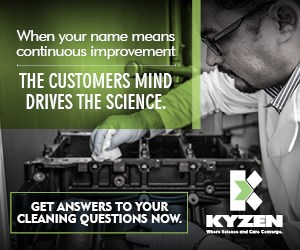The Sacrifices of World War II in the Plating Industry - A Reflection in Light of the Covid Pandemic
Eighty years ago this month, our involvement in World War II began with the attack on Pearl Harbor. It was the existential crisis for the 20th century, for America and the world. Thus far, the ongoing COVID pandemic may well be considered the existential crisis for the 21st, although we’ve just gotten started and climate issues lurk in the future. At the 1942 AES Convention, the first after Pearl Harbor, a special session was held, covering how the surface finishing industry was affected by the war effort. It is worthwhile at this juncture to look back on this, especially in light of today’s pandemic.
Introduction by
James H. Lindsay
NASF Technical Editor
Fenton, Michigan, USA
Technical Editor’s Note: A printable pdf version of this introduction is available HERE.
Eighty years ago this month, our involvement in World War II began with the attack on Pearl Harbor. It was the existential crisis for the 20th century, for America and the world. Virtually everyone was impacted by the events of that global conflict as the nation mobilized for the four-year struggle.
Eighty years later, the ongoing COVID pandemic may well be considered the existential crisis for the 21st, although another eight decades remain in the century and global climate matters may or may not make the pandemic look like small potatoes. Nonetheless, both the war and the pandemic drastically changed everyday life for almost everyone. From employment arrangements to supply chain problems as a result of the pandemic, the surface finishing industry has been severely affected, and normalization of our businesses is still in the future.
While the saga of the pandemic has yet to play out, it is worthwhile at this juncture to look back and see how the surface finishing industry was affected by the war effort. It was drastic, and indeed many of the sacrifices made exceeded the harsh measures that have been endured with the pandemic.
In 1942, the American Electroplaters’ Society held its 30th annual convention in Grand Rapids, Michigan. This was the first convention after Pearl Harbor and America’s entry into World War II. Our covert efforts to help the Allies in Europe had become overt and the war expanded to the Pacific theater as well. The entire focus of the nation was on victory, and both civilian life and industry required major sacrifices.
What follows here are three papers, comprising the first educational session, dubbed the “Victory Session,” of the 30th AES Convention held on June 8, 1942, at the Pantlind Hotel in Grand Rapids, Michigan. Due to the wonders of talented stenographers, the published proceedings were verbatim, including the introductions as well as the discussions which followed the three presentations:
- “The Present Situation in The Electroplating Industry as Regards Government Restrictions and Government Business” by William McCord (available online at http://short.pfonline.com/NASF21Dec1a)
- “Military Applications of Electroplating” by William Blum (available online at http://short.pfonline.com/NASF21Dec1b)
- “Conservation Program of The War Production Board” by Harvey A. Anderson (available online at http://short.pfonline.com/NASF21Dec1c)
The discussion following the three papers is available online at http://short.pfonline.com/NASF21Dec1d.
Related Content
-
Hexavalent-Chromium-Free Aluminum Sacrificial Paint Validation
Hexavalent chromium is a known carcinogen, repro-toxin and mutagen. Its elimination is of high importance to the aerospace industry, which has struggled to find high performing alternatives. Legacy aluminum sacrificial paints have traditionally utilized hexavalent chromium to prevent corrosion and coatings which are equal to or better than have been difficult. This second of two papers discusses the hexavalent-chromium-free process from the user point-of-view in terms of the process validation work by Rolls Royce Corporation.
-
Looking to the Future of Finishing
Products Finishing takes a look at some of the ways the finishing industry is investing in workforce development and educational initiatives.
-
High Gloss Black for Fasteners
Specialty functional finish for black fasteners.















